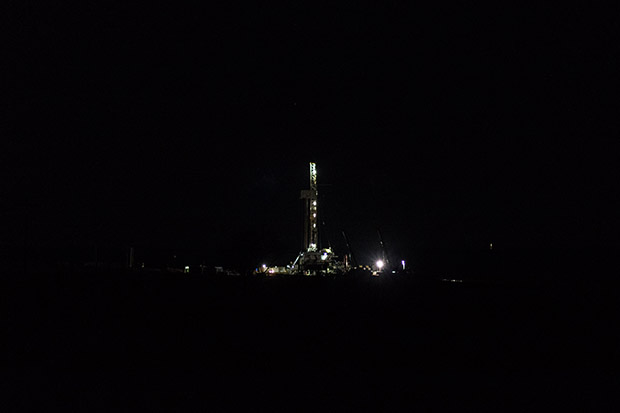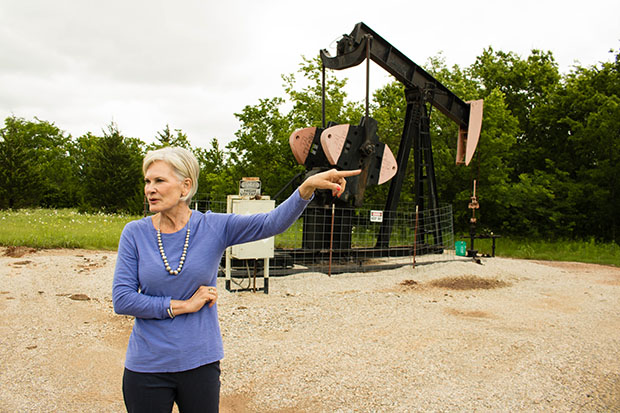
Lights from a drilling rig near Watonga, Okla.
Joe Wertz / StateImpact Oklahoma


Lights from a drilling rig near Watonga, Okla.
Joe Wertz / StateImpact Oklahoma

Joe Wertz / StateImpact Oklahoma
Lights from a drilling rig near Watonga, Okla.
The 2017 legislative session is beyond the halfway point and the clock is ticking on lawmakers who have until the end of May to set the state’s budget and plug an $870 million funding hole. Legislators say every option is on the table, including one with growing public support: Increasing taxes on oil and gas.
First, it was state Democrats like minority leader Scott Inman, who have long argued Oklahoma’s taxes are too generous for oil and gas companies.
Next, educators like retired principal Debbie Lobdell-Brooks rallied to rescue cash-strapped schools and underpaid teachers. Traveling to the state capitol in March, Brooks pushed lawmakers to end a three-year discount on taxes levied on oil and gas production at newly drilled wells.
“It brings us more in line with other states across the country,” she said. “Why does Oklahoma have to have the best deal in the land?”
Then came Republican State Auditor and Inspector Gary Jones, who is considering a run for Governor. He called for ending the tax on new wells and installing an across-the-board 5 percent rate that amounts to an overall increase in taxes many energy companies pay.
“They’re drilling in other states that have higher rates,” Jones says. “This allows us to stabilize that revenue over a long period of time and do what’s in the best interest of all Oklahomans, not just a handful.”
And, in a twist, oil and gas executives themselves rallied at the Capitol to tell lawmakers they, too, want to end the discount period and an even higher 7 percent tax on all energy production.
“I’d like to see other people pay their fair share,” said Darlene Wallace of Columbus Oil in Seminole, Oklahoma.

Joe Wertz / StateImpact Oklahoma
Columbus Oil Company owner Darlene Wallace in the field with a "stripper well," which produces two-and-a-half barrels of oil a day.
The public line among leaders of both Oklahoma’s Republican-dominated House and Senate is: They’re listening. Any idea is worth considering, they say, including raising gross production taxes on oil and gas.
It’s hard to know how serious they are. While Republican leaders aren’t openly championing specific legislation to raise oil and gas taxes, they’re not dismissing the idea outright — which isn’t insignificant in oil-rich Oklahoma.
Right now, Oklahoma has four different rate structures for oil and gas taxes, but new wells are taxed at 2 percent for three years and 7 percent after that.
Conventional wisdom suggests Republicans won’t touch the tax rates. Oklahoma legislators also need a three-fourths supermajority in both chambers to pass a tax increase of any kind.
There are political pitfalls to any type of tax hike in Republican-led Oklahoma; at this point, lawmakers haven’t even agreed to raise taxes on cigarettes. It’s unclear if Republican leaders are really entertaining the thought of higher oil and gas taxes — and if it’s enough to force a compromise on oil industry in-fighting.
While a small number of oil and gas companies say they support gross production tax increases, other major industry players are out to protect taxes at rates they fiercely negotiated for in 2014.
Crude oil prices are trending upward and the state has two booming oilfields drawing investment from around the country, representatives for these energy firms say.
“I just don’t think it’s a wise business or financial policy move to change that at this point in time,” Tim Wigley, vice president of government affairs for the Oklahoma Independent Petroleum Association, told reporters at the capitol. “We just went through layoffs and bankruptcies and so forth in this industry. It impacted Oklahoma pretty pretty significantly. We want to protect the investment that’s coming here and encourage it.”
Many of the oil and gas companies that are backing higher production taxes are already paying them. They are often operating older, vertical wells taxed at 7 percent.
These operators, who have splintered off and created their own industry group, the Oklahoma Energy Producers Alliance — spearheaded by former Tulsa Mayor Dewey Bartlett Jr. — want to tie the tax issue to proposed legislation they say could do a lot more damage to their bottom lines.
Many large oil and gas companies are backing legislation that allows them to drill longer horizontal wells in non-shale rock layers. Joe Warren, a partner of Cimarron Production Company, and other members of the Producers Alliance say these “long laterals,” as they’re called, can be drilled through regions that supply oil and gas to vertical wells and reduce the flow.
“We had one particular area where our production is probably off 70 to 80 percent from what it was prior to the horizontal development,” Warren says.
The Producers Alliance also says the horizontal wells are completed with fracking, which damages their vertical wells and other equipment. Longer laterals, they say, will lead to more fracking and costly problems at their vertical wells.
There are a couple of different Senate bills to permit long laterals, SB 284 and SB 669, and while the final language is still in play, members of the Producers Alliance say they won’t support the legislation unless it requires 50 percent approval of nearby vertical owners. That would force horizontal drillers to make deals to get their sign off.
Wigley, with the pro-lateral OIPA, told reporters the vertical producers are publicly supporting oil and gas tax increases to win political leverage on the long lateral legislation.
“I appreciate that wonderful history behind vertical drillers here in Oklahoma, they are a rich part of our history. But the future of the industry is horizontal drilling, and most of the investment you’re seeing coming into the state is because of horizontal drilling,” he said.